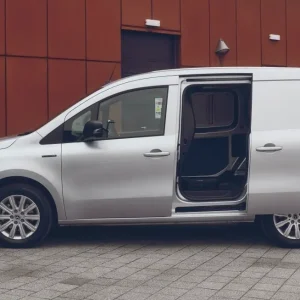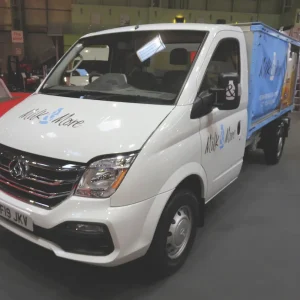All sensible light commercial operators can see the need to reduce fuel consumption and thus CO2 output, not to mention emissions of NOx, particulates and other harmful pollutants.
At the same time they are cautious, and not necessarily ready to head down the battery-electric or plug-in hybrid route yet. If they opt for Ford’s remarkably successful front-wheel drive Transit Custom, however, then they can avail themselves of a handy halfway house.
While the Custom’s availability in PHEV (plug-in hybrid electric vehicle) guise has received extensive publicity, there has been rather less focus on the MHEV (mild-hybrid electric vehicle) version.
It features a belt-driven integrated starter/generator (BISG) rather than an alternator plus a 10Ah 48V air-cooled lithium-ion battery that sits under the passenger seat. The BISG enables the battery to capture and store energy that would otherwise be lost when the van decelerates, and use it to power the Custom’s electrical system, including its electric power steering.
Result? Less effort is required from the engine, and that spells good news for fuel usage.
The BISG also acts as a motor, using the stored energy to provide the engine with a bit of torque assistance when the driver accelerates. That too has a positive impact on fuel usage.
What is more, the MHEV is fitted with an upgraded auto stop-start system that cuts the engine as soon as the Custom is stationary, even if it is still in gear.
It also kills the engine if the van is coasting to a stop, while the driver can adjust the coasting speed at which it operates: the range of adjustment is from 7mph to 12mph. It can be switched off if necessary.
The consequence of all this technology is that diesel consumption is said to be down by anywhere from approximately 3% to as much as around 8%.
The MHEV package is married to the 130hp version of the Custom’s 2.0-litre Ecoblue diesel engine. But the powerplant is also up for grabs at 105hp, 170hp and 185hp – the last-named is a recent arrival – and has recently benefited from an upgraded turbocharger plus new fuel injectors operating at a higher pressure of up to 2,200 bar.
Other changes include the introduction of steel pistons, which replace the old cast-aluminium ones and have a slimmer skirt design, plus a variable-flow oil pump. It reduces parasitic losses by adapting oil delivery to demand.
These changes should cut the Custom’s mpg figure by up to 6%, says Ford, before the benefits claimed for the MHEV are added to the equation.
We got to grips with Ford’s MHEV offering in a short-wheelbase standard-roof Custom in Trend trim, and we enjoyed the experience. It costs £700 more than the standard diesel model.
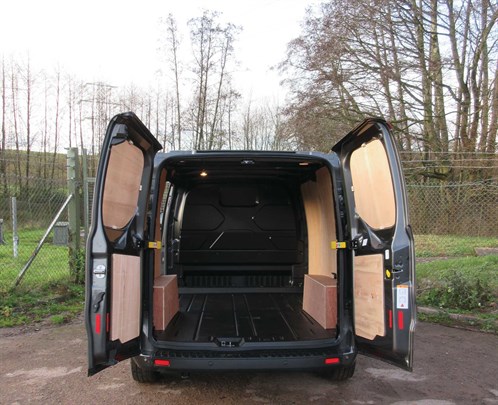
Load bay
Access to our demonstrator’s 6.0m3 cargo area was by means of a sliding nearside door plus twin rear doors that can be swung through 90°, or through 180° if the stays are released.
For your money you get a full-height steel bulkhead and eight load tie-down points, including one above each wheel box.
The boxes in our demonstrator were well-protected against minor damage.
The cargo bay had been timbered out, with a tailored cover protecting the load floor.
Two load area lights provided useful illumination when we had to unload the van late at night.
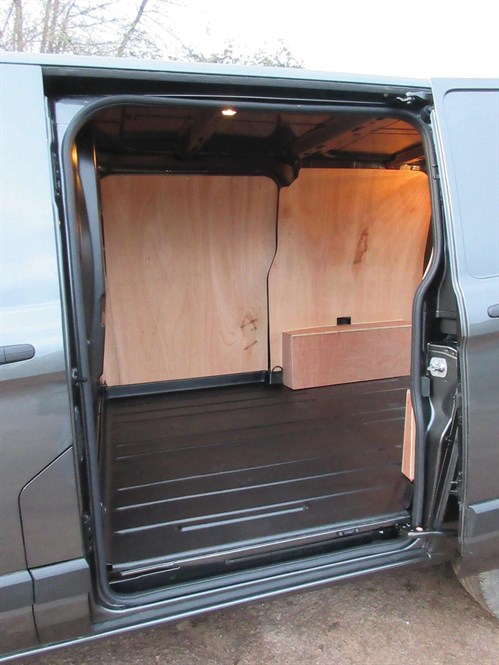
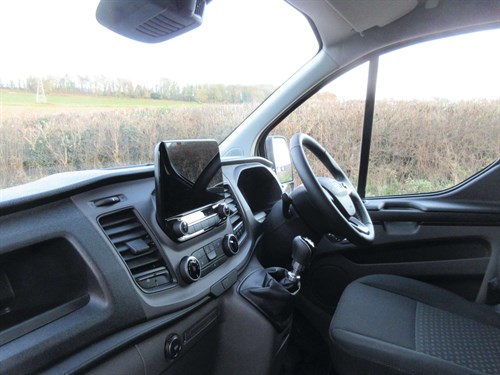
Interior and equipment
Our test van was equipped with a Sync 3 communications and entertainment package with a DAB radio, Bluetooth connectivity and an 8in colour touchscreen. Featuring AppLink, which enables smartphone apps to be accessed, Sync 3 can be integrated with Apple CarPlay and Android Auto, and voice commands can be used to control certain functions.
Emergency Assist is installed, which means that help will be summoned promptly if there is an accident.
Also provided are two USB sockets and two 12V power points.
Other useful facilities in the three-seater cab include a trip computer, a Quickclear heated windscreen, cruise control with an adjustable speed limiter, electric windows, and power-foldable and electrically adjustable and heated exterior mirrors with a lower wide-angle section. Reversing sensors should minimise the risk of damage or injuries to passing pedestrians when backing up, and are combined with front parking sensors.
Storage facilities include four shelves of varying sizes on top of the dashboard and a roomy lockable glove box with a shelf above it. You will find three bins with different capacities in each of the doors plus a moulding that can accommodate a big bottle of water.
Look up and you will see a shelf for your sunglasses positioned just above the windscreen.
A bottle holder and a decent-sized cup-holder sit at either end of the fascia, and a flip-down cup-holder is built into the moulding that houses the gear lever.
The moulding does not restrict the legroom of whoever occupies the middle seat. The centre section of the seat’s back folds downwards and turns into a desk complete with two cup-holders, a tray for your pens, and an elasticated band to keep paperwork in place.
Under-seat storage space is at a premium, alas, due to the presence of the aforementioned 48V battery. Its presence also makes any provision of a load-through facility – a flap in the bottom of the bulkhead that allows you to push the end of extra-long items under the seats – problematic.
The driver’s seat, which boasts an inboard armrest, and the leather-trimmed steering wheel are both height-adjustable. The latter is reach-adjustable too, and plays host to the radio’s remote controls.
Disc brakes are fitted all round and the Custom has electronic brakeforce distribution, emergency brake assist, electronic stability control and roll stability control. Other onboard electronic safety devices include traction control, which can be switched off, and side wind stabilisation. It is designed to stop the Custom being blown into an adjacent lane on the motorway if it is hit by a crosswind.
Bear in mind that a variety of safety packages are available as optional extras. They include lane-keeping alert and pre-collision assist, which warns if you are in imminent danger of having an accident.
Worth considering too is traffic-sign recognition with adjustable speed-limiter. It identifies the limit on whichever road the van is travelling down, and restricts its speed accordingly.
Front fog lights are standard on Trend derivatives along with LED daytime running lights, automatic headlights and rain-sensing windscreen wipers with a clap-hands action.
A driver’s airbag is fitted as standard. You pay extra for one to protect the passengers.
Turning to the suspension, independent MacPherson struts with variable-rate coil springs plus an anti-roll bar are installed at the front, while leaf springs help support the rear. Gas-pressurised shock absorbers are fitted all-round.
Decorated with plastic trims, our demonstrator’s 16-inch steel wheels were shod with 215/65 R16C Goodyear EfficientGrip tyres.
Turning circle? Wall to wall it’s 12.2m, shrinking to 11.6m kerb to kerb.
The side rubbing strips are finished to match the body’s overall paint finish, as are the mirror casings, front bumper, and the rear bumper’s end-caps.
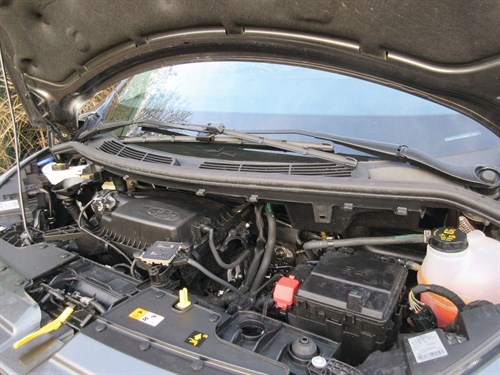
Engine and gearbox
Equipped with a variable-geometry turbocharger and employing a particulate filter, the Custom’s four-cylinder 16-valve diesel Ecoblue common-rail direct fuel-injection diesel produces maximum power at 3,500rpm. Top torque of 360Nm bites across a 1,500-2,000rpm plateau.
Selective catalytic reduction is fitted, which means that AdBlue is required to ensure the Custom meets the Euro6 exhaust emission regulations. It is held in a 21-litre reservoir and the filler point is beneath a flap on the nearside of the van’s body next to the diesel filler point.
A six-speed manual gearbox is the only transmission offered on MHEV models. A six-speedautomatic is available as an option on its standard diesel stablemates.
Driving
Once again Ford has come up with a slick, quick gear-change that makes it easy to get the best out of the Custom’s willing engine. Acceleration away from rest and up through the gears is strong thanks in part to the van’s MHEV technology, and a long drive from Herefordshire to Newcastle-upon-Tyne and back showed that the Custom is as competent on motorways as it is around town.
It rides well, even when lightly laden, and its handling is pin-sharp. Torque vectoring control, standard on the Custom, clearly helps. It reacts to the road surface 100 times a second, says Ford, balancing the amount of power delivered to each of the driven wheels in order to maximise grip.
Nor is the level of in-cab noise an issue. Wind and road noise are both well-suppressed, aside from a bit of noise from the tyres. The only time engine noise is noticeable is under acceleration, when the driver is rewarded by an encouraging growl.
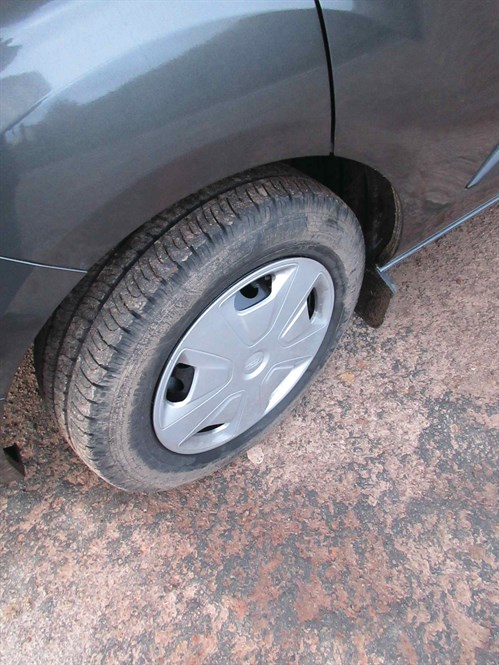
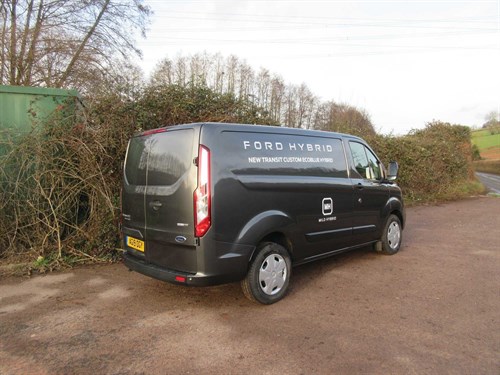
Operating
The Custom MHEV’s fuel consumption is lower than that of its conventional diesel equivalent, but not dramatically so.
Ford quotes an official combined WLTP (Worldwide Harmonised Light Vehicle Test Procedure) figure of up to 53.3mpg compared with 47.1mpg for the standard 130hp model.
We were achieving around 50mpg, but that was without switching to Eco Mode. Doing so alters the van’s torque setting and rate of acceleration among other functions. Such systems typically cut a vehicle’s fuel consumption by around 10%.
The Custom is protected by a three-year/100,000-mile warranty, while service intervals are set at two years/25,000 miles. An annual safety inspection is recommended.
The Custom is without doubt well-built. All the doors shut with a satisfying clunk and the van’s overall fit and finish is to a high standard.
Options fitted
Metallic paint (£650)
Ford Transit Custom Trend 320 L1H1 2.0 EcoBlue 130hp mHEV
Price (ex VAT) £28,050
Price range (ex VAT) £23,040-£43,600
Gross payload 1,239kg
Load volume 6.0m3
Load length 2,554mm
Load width (min/max) 1,351/1,775mm
Load bay height 1,406mm
Loading height 564mm
Rear door aperture 1,404 x 1,347mm
Side door aperture 1,030 x 1,324mm
Gross vehicle weight 3,200kg
Braked trailer towing weight 2,500kg
Residual value 20.4%*
Cost per mile 51.2p*
Engine size/power 1,995cc, 130hp @ 3,500pm
Torque 360Nm @ 1,500-2,000rpm
Gearbox 6-spd
Fuel economy 53.3 mpg
Fuel tank 70 litres
CO2 141g/km
Warranty 3yrs/100,000mls
Service intervals 2yrs/25,000 mls
Insurance group 40A
Price as tested £28,700
*after 4yrs/80,000mls; source: KwikCarcost
Rivals
Peugeot Expert
Price (ex VAT) £21,975-£32,960
Load volume 4.6-6.1m3
Gross payload 960-1,469kg
Engines 100hp 1.5 diesel, 120hp, 148hp, 174hp 2.0 diesel
Verdict: A respectable warranty, sensible service intervals and acceptable fuel economy help make the Expert worthy of further investigation, and equipment levels should keep most drivers happy. The Expert is also marketed through Citroen dealers under the Dispatch banner, through Vauxhall dealers as the Vivaro, and through Toyota dealers as the Proace.
Renault Trafic
Price (ex VAT) £22,800-£30,050
Load volume 5.2-8.6m3
Gross payload 1,036-1,255kg
Engines 120hp, 145hp, 170hp diesel
Verdict: Recently revamped, with new engines and the Efficient Dual Clutch gearbox offered for the first time, the Trafic features some sensible ideas, but is short on some of the more sophisticated safety devices seen on some of its rivals. Worth a look, but lacks the Ford Transit Custom’s solid appeal. Same model is sold by Nissan as the NV300 and by Fiat as the Talento.
VW Transporter
Price (ex VAT) £21,635-£36,915
Load volume 5.8-9.3m3
Gross payload 718-1274kg
Engines 90hp, 110hp, 150hp, 199hp diesel
Verdict: If you are looking for rock-solid residual values plus build quality to die for then the Transporter should be close to the top of your list. Safety standards are high, and the arrival of the T6.1 version is helping to keep the model fresh. Interior and exterior styling are on the dull side, however. Watch out for the electric e-Transporter due soon.
The Final Verdict
|
Design |
7/10 |
Mild hybrid tech brings economy benefits. |
|
Cabin |
8/10 |
Well-equipped and comfortable. |
|
Ride |
8/10 |
Better than direct rivals, especially when the vehicle is unladen. |
|
Refinement |
8/10 |
Noise levels are well-suppressed and nothing creaks or rattles. |
|
Load area |
8/10 |
Easy to access, it has a low loading height and tough-look bulkhead. |
|
Handling/performance |
9/10 |
Both among the best we’ve ever encountered in a van of this size. |
|
Engine/transmission |
9/10 |
Well-matched, with Ford offering a precise, high-quality gear-change. |
|
Standard equipment |
7/10 |
Basics are there, but more goodies wouldn’t go amiss. |
|
Operating costs |
8/10 |
Respectable mpg, sensible warranty/servicing, and healthy RVs. |
|
What Van? subjective rating |
8/10 |
Impressive mHEV costs more, but mpg benefits may be worth it. |

